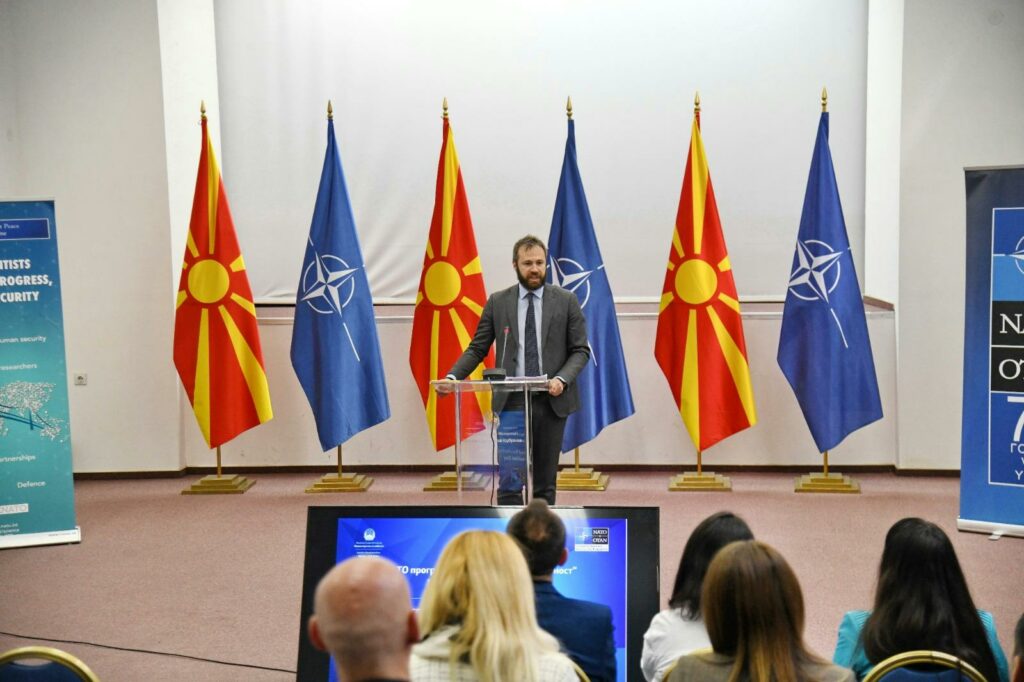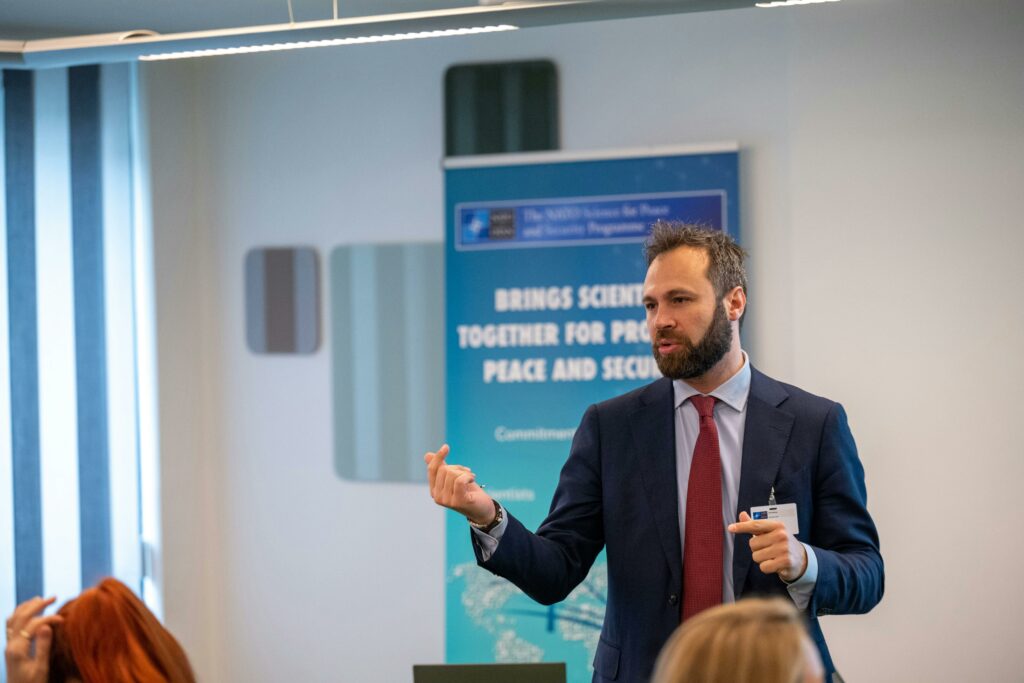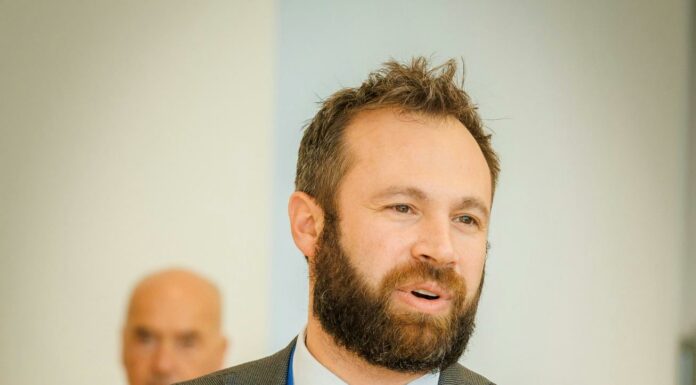An exclusive interview for Innovation with Claudio Palestini, head of the Department of Management and Coordination of NATO’s “Science for Peace and Security” program.
He recently participated in the Information Day of the NATO program “Science for Peace and Security” in Skopje, an event organized on the occasion of the fourth anniversary of North Macedonia’s membership in the Alliance.
NATO’s Science for Peace and Security Program connects the scientific community in NATO and Partner nations through collaboration in the field of science to address emerging security challenges. This program offers funding, expert advice and support to scientific projects relevant to civil security that meet the strategic objectives of NATO.
How to increase the participation of the Macedonian academic community in utilizing the advantages of this program was the key topic we discussed with Mr. Palestini.
Verica Jordanova
Mr. Palestini, for the beginning, please provide background information about NATO Science for Peace and Security program and your position in it?
The Science for Peace and Security (SPS) Programme is a pivotal research and development initiative of NATO, fostering dialogue and practical cooperation between NATO Allies and Partner Nations through scientific research, technological innovation, and knowledge exchange. The SPS Programme funds four main activities: multi-year research and development projects, research workshops, training courses, and study institutes. I have been part of the Programme for seven years, and for the past two years, I have had the honor of leading it. Together with a dedicated team of professionals, we oversee and support numerous activities, including day-to-day project management, milestone tracking, financial oversight, and result monitoring. Additionally, we extract valuable policy recommendations, demonstrate innovative concepts, and provide specific feedback to ensure that the projects we fund achieve their goals and deliver real-world benefits. We also strive to give visibility to these activities, showcasing the benefits NATO brings beyond peace and security.
You were recently in the Republic of North Macedonia as part of celebrations for the fourth anniversary of North Macedonia’s accession to NATO. The Alliance held a Science for Peace and Security (SPS) Information Day in Skopje. What are your impressions of this event?
Our SPS Information Day in Skopje was particularly significant, as it marked the fourth anniversary of North Macedonia’s accession to NATO. This event underscored NATO’s commitment to fostering scientific cooperation, not just political and military collaboration. This tradition dates back to 1956 with the initiative of the “Three Wise Men”, the Ministers of Foreign Affairs of Canada, Italy, and Norway, who advocated for non-military cooperation across the Alliance. North Macedonia, both as a Partner and now as an Ally, has been an active participant in SPS. The enthusiastic participation of the scientific community in Skopje was a testament to their commitment and interest in collaborative research. Researchers shared their experiences and inspired new scientists to join our efforts, highlighting the vibrant scientific dialogue within the SPS framework.
Can you compare the interest for participating in this program before our country entered the Alliance and in the last four years since we became a member of NATO?
The interest in the SPS Programme has remained consistently high. The Programme helps Partners to align with Allies in science and technology, fostering what we can call science diplomacy. Now, as an Ally, North Macedonia can take a leading role in SPS activities, being a role model for Partner Nations eager to enhance their cooperation with NATO. And in our team in Brussels, we just welcomed a new staff from North Macedonia, Dr. Blagoj Delipetrev. He will be managing SPS projects in the field of Artificial Intelligence bringing a strong experience and knowledge in this field.

According to your experience, which areas are the most interesting for Macedonian researchers, and what are the biggest achievements of North Macedonia from participation in the NATO SPS program?
Macedonian researchers have shown significant interest in cutting-edge technologies, from material science and nanocoatings to wearable sensors and artificial intelligence, also in the field of drone detection and classification. In crisis management, North Macedonia has been actively involved in the development and implementation of the Next-generation Incident Command System (NICS), a web-based command and control software that facilitates collaboration across all levels of preparedness, planning, response and recovery during natural disasters and other incidents. This involvement showcases its dedication to addressing contemporary challenges through innovative solutions.
How many active NATO SPS projects are currently in our country, and can you share some examples of which you are proud?
Currently, there are six ongoing SPS activities involving researchers from North Macedonia, and we are looking forward to kick-off a new one soon. One notable project, led by Prof. Igor Jordanov at Ss. Cyril and Methodius University, focuses on creating flexible military clothing materials resistant to fire, microorganisms, nerve agents, and UV light through non-toxic multilayer nanocoatings. During our visit to Skopje, we were impressed by the advanced laboratory he has developed with NATO’s support.

Do you expect this information event and shared experiences from Macedonian researchers to increase interest in the upcoming period? What are the biggest challenges to increase our participation in the program?
Every interaction with researchers sparks new ideas, and we anticipate increased participation from North Macedonia following this event. The primary challenge is the competitive nature of the Programme; only a small percentage of proposals receive funding. However, even rejections are opportunities for growth and improvement. Persistence and refinement of proposals are key to eventual success.
What, in your opinion, are the greatest advantages and opportunities that the NATO SPS opens up for a country?
Beyond funding, the SPS Programme offers invaluable opportunities for scientists to expand their networks, collaborate internationally, travel and spend time abroad, and receive expert feedback and advice. This is especially beneficial for PhD students and young researchers, who also receive stipends to complement their scholarships. For them, this is a unique opportunity. We support hundreds of Master’s and PhD students across Allies and Partner countries, empowering the next generation of scientists and showing tangible impacts of cooperation under NATO’s umbrella.
To conclude this interview, what would be your advice for academics, experts, and officials in North Macedonia regarding the NATO SPS program?
Stay connected with us through LinkedIn and our newsletter for the latest updates and opportunities. For young researchers, my advice is to be creative, take initiative, and apply. We are always excited to see innovative ideas transform into concrete projects. This spirit of creativity and perseverance is crucial for developing cutting-edge solutions and addressing the complex security challenges of our time.




